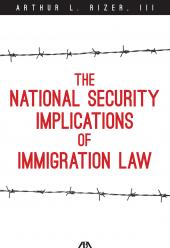The National Security Implications of Immigration Law
Select a format
 International Order Inquiry
International Order Inquiry
Select subscription type
Terms & conditions
Subscribers receive the product(s) listed on the Order Form and any Updates made available during the annual subscription period. Shipping and handling fees are not included in the annual price.
Subscribers are advised of the number of Updates that were made to the particular publication the prior year. The number of Updates may vary due to developments in the law and other publishing issues, but subscribers may use this as a rough estimate of future shipments. Subscribers may call Customer Support at 800-833-9844 for additional information.
Subscribers may cancel this subscription by: calling Customer Support at 800-833-9844; emailing customer.support@lexisnexis.com; or returning the invoice marked "CANCEL".
If subscribers cancel within 30 days after the product is ordered or received and return the product at their expense, then they will receive a full credit of the price for the annual subscription.
If subscribers cancel between 31 and 60 days after the invoice date and return the product at their expense, then they will receive a 5/6th credit of the price for the annual subscription. No credit will be given for cancellations more than 60 days after the invoice date. To receive any credit, subscriber must return all product(s) shipped during the year at their expense within the applicable cancellation period listed above.
The total price includes the product(s) listed in the Order Form and any Updates for a limited period (minimum period of 30 days) after the order is placed ("Order Window"). Shipping and handling fees are not included in the grand total price.
All shipments may be returned, at subscribers' expense, for full credit of the Price within 30 days of receipt.
Shipments may not be returned, and no credits will be issued, more than 30 days after receipt.
After the Order Window, subscribers will receive notice of Updates along with the then-current grand total price and order process as Updates become available. Subscribers will only be shipped those Updates they specifically request.
Product description
View a sample of this title using the ReadNow feature
Author Arthur Rizer is a trial attorney with the U.S. Department of Justice, and adjunct professor of law at Georgetown University Law Center. Rizer developed a casebook for his Georgetown class on the intersection of immigration law and national security issues, and expanded the casebook into this new handbook from the American Bar Association.
Immigration law is unique in its national security applications because, while it may be used as a mechanism for keeping the enemy out, it is also the apparatus for entry into the United States. Viewing "national security" in its broadest meaning, there is a clear security interest in maintaining the integrity of the borders while simultaneously preserving our role as a nation that offers refuge.
The National Security Implications of Immigration Law examines this topic first by conducting a historical overview of using immigration law for national security purposes, and then exploring the laws and cases themselves:
National Security Tools Imbedded in Immigration Law: the exclusion and deportation grounds under the Immigration and Nationality Act for national security threats including espionage and terrorist activity; the summary removal provision as a governmental tool against aliens who are perceived as threatening national security; The Alien Terrorist Removal Court; and the International Convention Against Torture and how it affects national security policy in the United States by its immigration implications.
Material Support Statute and Denaturalization: the immigration consequences of providing material support to a terrorist organization; waivers to the material support bar in the Immigration and Nationality Act; and denaturalization of U.S. citizens.
Protecting Classified Information with Immigration Law: the provisions and techniques that allow the government to aggressively protect the national security interests of the United States with little exposure of classified information.
The Front Line of Immigration: Detention: the government's ability to detain terrorist suspects for deportation purposes, particularly the case of Zadvydas v. Davis.
Using Criminal Immigration as a National Security Tool: how the 8 U.S.C. §§ 1324, 1325, and 1326 prosecutions are utilized both as a means to protect our physical borders from illegal immigration and to combat national security threats.
Liberty Concerns with Using Immigration Law as a Security Tool: the rule of law and its role in immigration and national security policy.
eBooks, CDs, downloadable content, and software purchases are noncancelable, nonrefundable and nonreturnable. Click here for more information about LexisNexis eBooks. The eBook versions of this title may feature links to Lexis+® for further legal research options. A valid subscription to Lexis+® is required to access this content.
 Lexis Nexis
Lexis Nexis 
